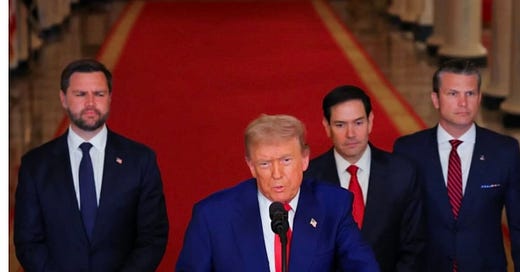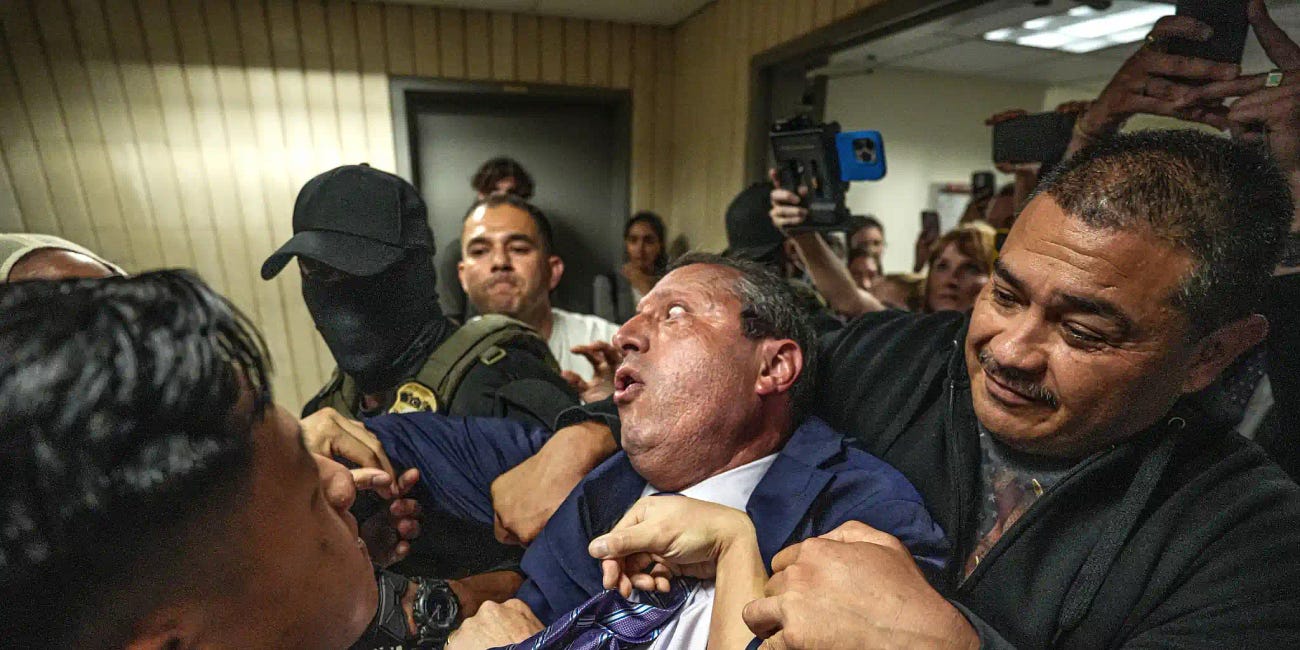The World is Burning but I’m Still Getting Slack Notifications
World War III is soft launching, but capitalism never sleeps.
I always imagined that if World War III broke out, my life would pause. The news would blare from radios. The streets would fill with people holding signs, or at least candles. I thought there’d be sirens, speeches, a collective moment of reckoning. But instead, the war started on a saturday night with a push notification. I was in sweats, half-watching love island, when my phone lit up: the US has launched airstrikes on Iran.
And then almost immediately another notification from my boss: can you take a quick look at the deck before the end of the weekend? There were no air raid sirens, no blackouts. Just a quiet hum of dread and a reminder that I still owe someone feedback on slide 12 by monday morning, if we make it that far.
It turns out the beginning of World War III doesn’t feel like an explosion. It feels like wondering whether to text your friends and name what’s happening, or pretend you didn’t see it so you can maybe sleep. It looks like trying to sit through meetings once the workweek begins, while a war unfolds just outside the frame of my screen. It looks like struggling to concentrate on a budget review while thinking about how four men I wouldn’t even trust to plan my birthday party just started a war they clearly have no idea how to end.
It looks like staring blankly at spreadsheets while replaying that tweet from Iran because apparently, in this version of reality, war declarations arrive in 280 characters or less, through the same app that tells me who got engaged, and which kind of yogurt I should buy.
I want to say this feeling is new, but it’s not. It’s just a louder, bloodier version of the disorientation I’ve felt every morning since the second Trump administration began, like I’m existing in two completely different worlds at once.
In one, I’m updating a budget for a campaign that assumes the future will still exist. I’m RSVP’ing for meetings, making projections for a quarter we may never reach. In the other, a war is being declared and downplayed simultaneously. We’re being lied to about its causes, just like we were lied to about the last one, and the one before that. A war criminal is plastered across our screens, thanking us for supporting a country that provides free healthcare to its citizens, while people here are forced to start gofundmes to afford insulin.
In that world, just last week, Marines were deployed in Los Angeles. The people who pick our fruit and wash our dishes are being dragged off sidewalks by masked federal agents. Families are literally hiding, Anne Frank-style, locked in their homes, afraid to answer the door.
Some mornings, I genuinely can’t tell if I’m supposed to care more about Q1 goals or martial law. How is it that I’m expected to call in sick for laryngitis, but not when troops are rolling down my street? How am I still expected to weigh in on font choices while a war rages in the background?
And I’ve come to accept that it’s not just me, and it’s not just now. This isn’t a temporary glitch. It’s the new architecture of our lives.
And this isn’t denial, it’s survival. Masha Gessen explores this dynamic in The Future Is History, documenting how Russians learned to compartmentalize their public routines while their country slid into an autocratic state. She calls it “the most dangerous phase” of decline, that quiet acceptance of a changed normal. We’ve seen this before: scheduled lives unfolding inside the shells of collapsing institutions.
And when you name it, people look at you like you’re being dramatic. But you’re not. You’re just awake.
And while all of this is terrifying, I made a promise when I launched this newsletter: to help you find the light, even when everything feels like it’s burning.
So here’s the part where I try to find something resembling hope. Psychology says that what looks like numbness—refreshing your inbox while the world collapses—is actually a kind of resilience. Not the heroic, cinematic kind, but the everyday kind that quietly insists on continuing. It’s built on emotional flexibility, community, the stubborn human need to make meaning even when everything feels meaningless. And while it doesn’t look like resistance in the traditional sense, maybe that’s what makes it powerful. Maybe the real rebellion is just… refusing to go numb. Refusing to stop noticing. Refusing to stop caring.
Because while the regime hopes we’ll just keep functioning, we’re actually not. We’re building budgets and building movements. We show up to zooms and to protests. Last week, 5 million people flooded the streets in No Kings Day, chanting and marching across 2,100 cities, from New York to Los Angeles to Guam. We’re disrupting the spectacle: Trump’s military-style parade fizzled, and our protests roared. We’re saying the future belongs to us.
That’s resistance. Not the grand narrative of coups or cataclysms, but the sweat of daily action. It’s knocking on doors before your 9 a.m. meeting. It’s passing out flyers after a long day of work. It’s tweeting outrage while your boss wonders why you didn't mute your mic. It’s being subscribed to this newsletter and reading it to stay informed and sharing it to inform others. It’s commenting on this post so it can reach more people. It’s supporting the work of journalists who are telling the truth amidst the chaos.
IF NO ONE HAS TOLD YOU TODAY, YOU ARE DOING GREAT.
And here’s more good news: social science says movements reach critical mass at 3.5% participation which is about 12 million of us. The “Hands Off” protests earlier this year and No Kings Day already hit that threshold, and they didn’t just mobilize millions. They mapped a base of collective resistance that can’t be ignored. Enough to change the country, and the world.
So yes, war is upon us. And yes, we still have spreadsheets. But we also have each other.
If you’ve made it this far, that means you’re still here. You’re still showing up. You’re still finding ways to care in a world that keeps begging you not to. You’re answering slacks and refusing to go numb. You’re surviving and dreaming and refusing to look away.
And that’s not nothing. In fact, that’s everything.
Keep going. We need you.
Before you go, I want to remind you to submit your boy problems!! I know we’ve all got them…personal, romantic, political. And yes, some of them start wars. We’re clearly dealing with one very big, very global boy problem right now. But I still want to hear about yours!! Please send them in and subscribe and rate our podcast!! :)
If You Think This Is Just Another News Cycle, Read a History Book.
If this made you feel more awake than afraid, you’re in the right place. Subscribe for more essays that connect the dots, call out the danger, and remind you you're not alone. Thanks for supporting my work! :)










who else is disassociating at work today?
Liz, thanks from the bottom and the top of my heart, dammit from my whole being, for taking time out from your hectic schedule to pen this reminder that we’ve been here before and there’s a new generation still carrying the torch. This crone was bending over and kissing her ass goodbye in the sixties, marching against sending Kiwi lads to the Vietnam war, and on the streets for a nuclear-free New Zealand, and against apartheid (huge) and getting into the Iraq war. I’m so grateful to your generation for carrying the torch because I may live at the bottom of the world but what’s happening in your front yard is knocking on our back door.